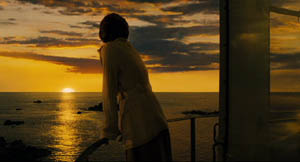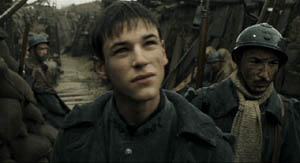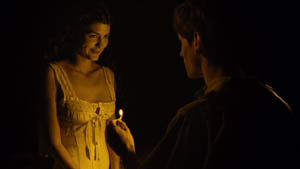|
Jean-Pierre Jeunet films have something about them that sticks with you. Partly, it's the sheer cinematic vision he brings; his films are nothing if not exquisitely crafted. His first two features (co-directed with Marc Caro), Delicatessen and The City of Lost Children, exhibited this in an enormous degree, feeling almost like stories more designed than told, with that casual aloofness so common to European cinema. Amelie took a warmer, more convivial approach, albeit one exhibiting just as much stylized production, and was a major hit both at home and abroad, i.e. here in America, where most of the populace reads on an eighth-grade level and tends to disdain subtitles. (Yes, I skipped right over Alien Ressurrection, and I bet Jeunet wishes he'd done likewise.) A Very Long Engagement is less eager and ingratiating than his breakout international hit, but far from being a retreat into emotional reserve, it stretches farther and more subtley into the depths of human feelings than anything he's ever attempted before, and does so without the sort of cloying sentimentality we now fully expect from domestic efforts. 
In the trenches between the French and German armies during World War I, five men are sentenced to death for self-injury, deemed cowards for attempting escape from the war that has traumatized them. There's a perversity in the attitudes of such leadership, responding to those who've been tormented by the inhumanity of war by doling out greater inhumanity, while they themselves sit sheltered and safe far from the battle lines (as Stanley Kubrick had previously observed in his excoriating indictment of war, Paths of Glory). Years later, Mathilda, long-suffering fiancÚ of one of the men, wonders what happened to her lost love, refusing to believe he was claimed by the conflict. While Mathilda's search for her missing Manech forms our through-line, the solving of the puzzle will ultimately require her to learn of the lives and fates of the other four men, as well. At the same time, senior officers and officials responsible for the death sentence begin dropping like flies, victims of a mysterious woman assassin. Not content to be genre-bound, A Very Long Engagement is a war story, a love story, and a detective story weaved effortlessly into a whole. 
This is an intensely emotional film. Please note the use of the word "emotional," which is too often employed as a synonym for "depressing." Here, we're given a run of the full gamut of human feelings. Some parts are unquestionably (and understandably) melancholic; others, such as a scene involving a series of briefly-lit matches and leading lady Audrey Tautou's gradually disappearing wardrobe, are anything but. The piece is colored throughout by bittersweet tragedy wrapped in probably ill-advised hope. Mathilda's aunt and uncle believe she is only setting herself up for a greater fall by refusing to relinquish her belief in Manech's survival. She almost compulsively challenges fate, as she regularly creates arbitrary tests of destiny, eg. "If I reach the bend in the road before the car passes, Manech will return safely." In accordance with logic, half of these tests produce undesireable results. Already crippled by polio in her childhood, will her pursuit of the truth bring her anything but more pain? 
Jeunet remains one of cinema's great visual stylists. His individual shots are more often than not suitable for framing, his choice of lighting and framing evoking a painterly quality to the image. At other times, the motion tells us everything. An early scene shows one of the unfortunate men's conscription into service, as he encounters the bearers of his papers in a wheat field while riding home with a full cart of hay. Flattening the stalks as it moves, a wind rushes from the government officers to the farmer's cart, lashing his straw into the air, whisking his livelihood away. It's a scene of minor importance in the overall film, which merely serves to illustrate the care and precision taken with the work as a whole. Jeunet's previous fascination with elaborate Rube-Goldberg contrivances surfaces again, though in a subtler manner more befitting the more serious material found herein. With excellent characters and performances, gorgeous photography, and a playful sense of storytelling, this, for now, reigns as the director's best work, and that's saying quite a lot. -review by Matt Murray
|
|
||||||||